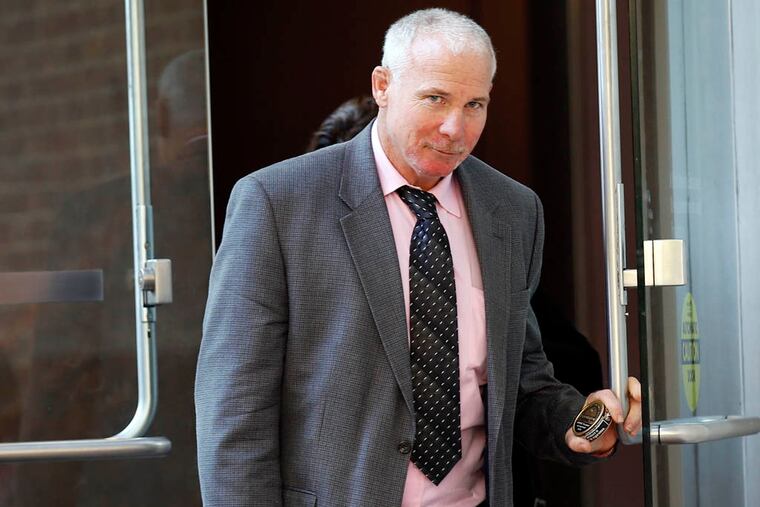Ironworker gets 75 months for ugly 'nightwork'
James Walsh opened the door to Courtroom 3A and peered at the more than two dozen people gathered at the federal courthouse to support him. "Showtime," he said.

James Walsh opened the door to Courtroom 3A and peered at the more than two dozen people gathered at the federal courthouse to support him. "Showtime," he said.
One by one - his children, his friends, his Alcoholics Anonymous companions, and even one of his victims - spoke on his behalf Tuesday afternoon before U.S. District Judge Michael Baylson.
Walsh was the first of 12 ironworkers to be sentenced for his role in a racketeering conspiracy case against Ironworkers Local 401. His advocates said Walsh was a caring man, but not the smartest, who made mistakes.
And, prosecutors said, Walsh displayed exemplary cooperation with the government against his fellow union members.
"I don't dispute that," Baylson said. "But I can't ignore the nature of the crimes here."
After 13 witnesses asked Baylson for leniency, the judge sentenced Walsh to 75 months on charges of racketeering conspiracy and arson. His prison term is to begin May 4.
Sentencing guidelines called for a minimum of 35 years in prison. That was negotiated down to 15 years, and then all minimums were waived at prosecutors' request.
Assistant U.S. Attorney Robert Livermore recommended 72 months. William J. Brennan, Walsh's attorney, asked for 60. Walsh apologized for his crimes, saying he prayed for fair punishment.
"We're actually pleased with the sentence," Brennan said afterward.
Walsh, 50, labeled in court filings by a coworker as the union's "big-time hit man," set fire to two nonunion construction sites, including a December 2012 attack on a Quaker meetinghouse construction site in Chestnut Hill.
A pattern of arson - Walsh was caught by FBI agents on a third attempt - suggested "a warped mind, a criminal mind," Baylson said.
Walsh's malicious "nightwork" was his bid to earn favor among the ironworkers for a possible post on its board of trustees and more financial security for his family, prosecutors said.
"I felt betrayed by him," Walsh's youngest son testified Tuesday. "But in the last few months, seeing how it tore him up, I know he is remorseful."
Walsh's testimony against Joseph Dougherty helped convict the longtime union head. Walsh faced hostile former colleagues in a courtroom during that trial.
"It was very difficult for him to walk into that courtroom and testify," Livermore said.
Some ironworkers view Walsh as a traitor, testified Kevin McCarthy, a friend.
Carolyn Schodt, a member of the Chestnut Hill Friends Meeting whose meetinghouse was damaged by Walsh's arson, accepted his plea for forgiveness.
"Quakers believe there is that of God in everyone," she said," and we certainly believe this is true of all of the ironworkers involved in this case."